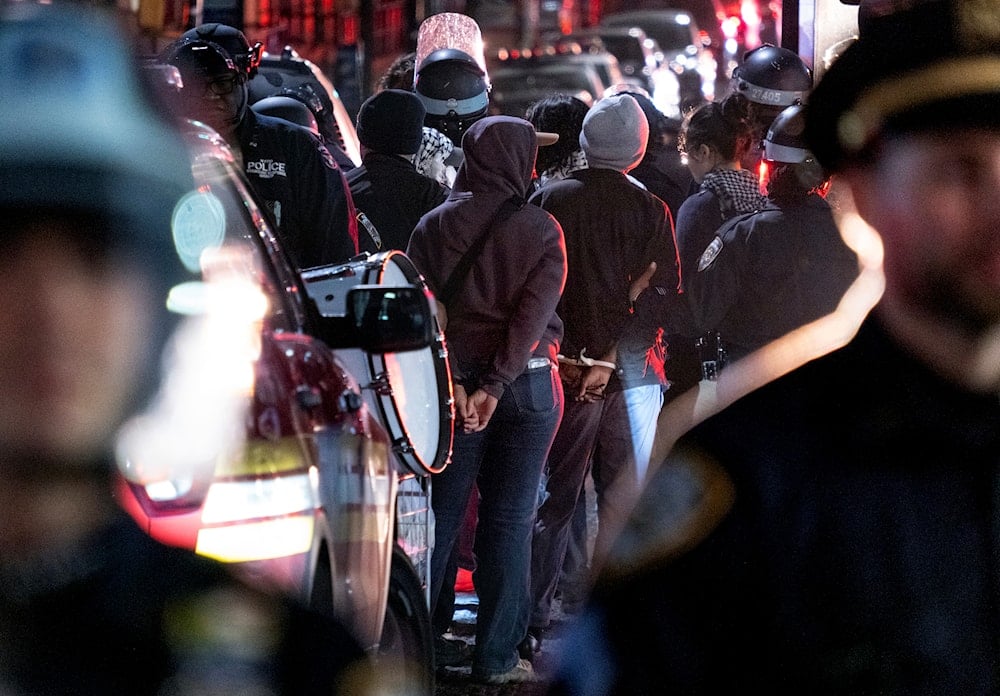Columbia caves in to pressure; 80 expelled over Gaza solidarity
Columbia University’s unprecedented expulsions of pro-Palestine activists raise serious concerns about academic freedom and the right to peaceful protest on campus in the US.
-

New York City police officers take people into custody near the Columbia University campus in New York Tuesday, April 30, 2024, after a building taken over by protesters earlier in the day was cleared, along with a tent encampment. (AP)
Columbia University has expelled nearly 80 students for their roles in pro-Palestine protests earlier this year, including a high-profile library sit-in during final exams and an encampment staged over alumni weekend.
The sweeping disciplinary action, announced Tuesday, marks one of the most aggressive responses by an American university to campus demonstrations related to the ongoing Israeli genocide in Gaza.
According to Columbia University Apartheid Divest (CUAD), the coalition behind the protests, expelled students have been banned from the university for periods ranging from one to three years. Some recent graduates also had their degrees revoked. Columbia confirmed the expulsions and said additional students faced disciplinary actions, such as probation and suspensions.
The crackdown centers on the takeover of Butler Library in May, which university officials alleged disrupted campus operations and violated multiple conduct codes. These are the first major rulings issued by the newly restructured University Judicial Board (UJB), which was moved under the provost’s office in March. Previously housed under the University Senate, the UJB was criticized by the Trump administration for being too permissive toward protest-related offenses.
Punishing students for activism
A Columbia spokesperson claimed the timing of the disciplinary decisions was tied to internal procedural reforms, not to political pressure or federal negotiations. But the move comes as universities nationwide face intense scrutiny from lawmakers and donors over perceived failures to respond firmly to pro-Palestine activism on campus.
In parallel with the crackdown, Columbia announced it will adopt the International Holocaust Remembrance Alliance’s (IHRA) definition of antisemitism, a move that has drawn both praise and concern. Critics argue the definition could conflate criticism of Israeli policy with antisemitism and stifle legitimate political expression. The university also plans to appoint civil rights coordinators and partner with Jewish organizations to provide mandatory anti-discrimination training for students and faculty.
Columbia’s Acting President Claire Shipman has taken a hard line against CUAD, stating on July 15 that the university would not “recognize or meet with” the coalition or its affiliates. “Organizations that promote violence or encourage disruptions of our academic mission are not welcome on our campuses, and the University will not engage with them,” Shipman told Bloomberg.
CUAD responded sharply, condemning the disciplinary actions as “politically motivated” and “wildly disproportionate". In a statement, the group said the penalties “hugely exceed precedent for teach-ins or non-Palestine-related building occupations.” It vowed to continue its activism, declaring, “We will not be deterred. We are committed to the struggle for Palestinian liberation.”
The disciplinary crackdown comes amid heightened tensions on college campuses across the US, where debates over the Israeli war on Gaza and free speech have escalated into national flashpoints.
Columbia has become a national flashpoint amid a broader crackdown in the US targeting students who engage in pro-Palestine activism, drawing widespread attention for its harsh administrative measures against campus protests.

 3 Min Read
3 Min Read










